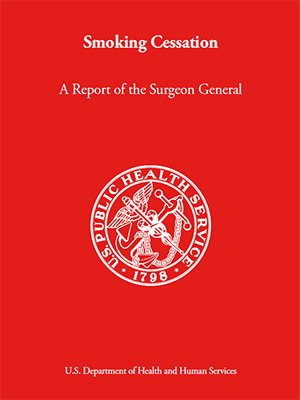Smoking Cessation: A Report of the Surgeon General
Source: https://www.hhs.gov/sites/default/files/2020-cessation-sgr-full-report.pdf
Major Conclusions of the Report
1. Smoking cessation is beneficial at any age. Smoking cessation improves health status and enhances quality of life.
2. Smoking cessation reduces the risk of premature death and can add as much as a decade to life expectancy.
3. Smoking places a substantial financial burden on smokers, healthcare systems, and society. Smoking cessation reduces this burden, including smoking-attributable healthcare expenditures.
4. Smoking cessation reduces risk for many adverse health effects, including reproductive health outcomes, cardiovascular diseases, chronic obstructive pulmonary disease, and cancer. Quitting smoking is also beneficial to those who have been diagnosed with heart disease and chronic obstructive pulmonary disease.
5. More than three out of five U.S. adults who have ever smoked cigarettes have quit. Although a majority of cigarette smokers make a quit attempt each year, less than one-third use cessation medications approved by the U.S. Food and Drug Administration or behavioral counseling to support quit attempts.
6. Considerable disparities exist in the prevalence of smoking across the U.S. population, with higher prevalence in some subgroups. Similarly, the prevalence of key indicators of smoking cessation—quit attempts, receiving advice to quit from a health professional, and using cessation therapies—also varies across the population, with lower prevalence in some subgroups.
7. Smoking cessation medications approved by the U.S. Food and Drug Administration and behavioral counseling are cost-effective cessation strategies. Cessation medications approved by the U.S. Food and Drug Administration and behavioral counseling increase the likelihood of successfully quitting smoking, particularly when used in combination. Using combinations of nicotine replacement therapies can further increase the likelihood of quitting.
8. Insurance coverage for smoking cessation treatment that is comprehensive, barrier-free, and widely promoted increases the use of these treatment services, leads to higher rates of successful quitting, and is cost-effective.
9. E-cigarettes, a continually changing and heterogeneous group of products, are used in a variety of ways. Consequently, it is difficult to make generalizations about efficacy for cessation based on clinical trials involving a particular e-cigarette, and there is presently inadequate evidence to conclude that e-cigarettes, in general, increase smoking cessation.
10. Smoking cessation can be increased by raising the price of cigarettes, adopting comprehensive smoke- free policies, implementing mass media campaigns, requiring pictorial health warnings, and maintaining comprehensive statewide tobacco control programs.
